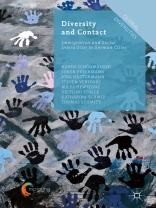This book analyzes how the socio-demographic and cultural diversity of societies affect the social interactions and attitudes of individuals and groups within them. Focusing on Germany, where in some cities more than one third of the population are first or second-generation immigrants, it examines how this phenomenon impacts on the ways in which urban residents interact, form friendships, and come to trust or resent each other. The authors, a distinguished team of sociologists, political scientists, social psychologists, anthropologists and geographers, present the results of their wide-ranging empirical research, which combines a 3-wave-panel survey, qualitative fieldwork, area explorations and analysis of official data. In doing so, they offer representative findings and deeper insights into how residents experience different neighbourhood contexts. Their conclusions are a significant contribution to our understanding of the implications of immigration and diversity, and of the conditions and consequences of intergroup interaction. This ground-breaking work will appeal to scholars across the Social Sciences.
Tabla de materias
Chapter 1. Introduction.- Chapter 2. The ‘Diversity and Contact’ Project (DIVCON).- Chapter 3. Diversity in Germany and its Urban Neighbourhoods.- Chapter 4. Interactions Across Boundaries in More and Less Diverse Contexts.- Chapter 5. Five Stories of Neighbourhood, Social Life, and Diversity.- Chapter 6. Attitudes Towards Immigration-Related Diversity.- Chapter 7. The Immigrant Perspective.- Chapter 8. Conclusions.
Sobre el autor
Karen Schönwälder is a Research Group Leader at the Max Planck Institute for the Study of Religious and Ethnic Diversity and Professor at the Georg August University in Göttingen, Germany.
Sören Petermann is Team Leader at GESIS – Leibniz-Institute for the Social Sciences, Germany.
Jörg Hüttermann is a Researcher at the Institute for Interdisciplinary Research on Conflict and Violence at Bielefeld University, Germany.
Steven Vertovec is Director at the Max Planck Institute for the Study of Religious and Ethnic Diversity, and Honorary Joint Professor of Sociology and Ethnology, University of Göttingen, Germany.
Miles Hewstone is Professor of Social Psychology at the University of Oxford, UK.
Dietlind Stolle is the Director of the Inter-University Centre for the Study of Democratic Citizenship at Mc Gill University, Canada.
Katharina Schmid is Research Associate at the Oxford Centre for the Study of Intergroup Conflict, UK.
Thomas Schmitt is a Human Geographer at Friedrich-Alexander University in Erlangen-Nürnberg, Germany.












